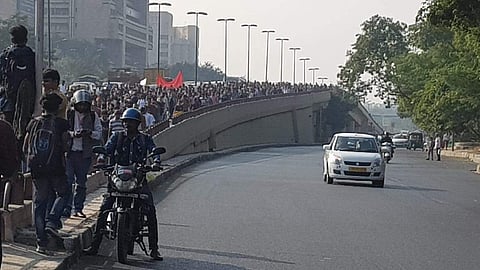JNU protests rock Delhi once more, students say no to MHRD's 'high-power' peace committee
The students of the Jawaharlal Nehru University (JNU) rocked the national capital with a march to parliament that ended in chaos — as their leaders were detained and carted away by the police. This happened despite the police declaring Sec 144 around the campus and shutting the gates of the varsity by barricading the entrances with swathes of police personnel on Monday morning. After they were allowed to march, at around 11.30 am, students were seen on the streets of the national capital exactly a week after their massive protest outside the AICTE auditorium against the draft hostel manual and massive fee hike.
To add to their angst, the MHRD's announcement that they were appointing a high-power committee to resolve issues did not go down well. Responding to this, the JNU Students' Union (JNUSU) said that the MHRD should not just form a committee but announce the withdrawal of both the draft hostel manual and the Executive Council's decisions about its adoption as well. "The JNUSU, which is the elected representatives of the students, and the JNUTA must be treated as stakeholders. An explicit assurance must be given that any decision on the manual will be taken as per proper and established process," they said. "The established process in JNU cannot and must not be short-circuited in the name of any high powered committee decisions. The JNUSU, as the elected representative of the students, is part of this established process and any intervention on the JNU issue must explicitly invite the active participation of JNUSU. The MHRD should hold the JNU VC and his administration accountable as he is responsible for the disruption in the normal functioning of JNU," added the JNUSU.
CPI(M) general secretary Sitaram Yechury on Monday condemned the police action on protesting students of the Jawaharlal Nehru University, saying it was not the right way to deal with democratic protests. "This is Modi's emergency. The number of police personnel present at the spot of the protest is higher than what we saw during an emergency," Yechury said during a press briefing in Delhi.
Students were allowed to march towards the Parliament once they promised a peaceful march but were stopped a kilometre from the campus and were not allowed beyond the third layer of security. The students built a human chain and brought down many of the barricades. This started a brawl with the police and many of the students including JNUSU President Aishe Ghosh were detained when they tried to climb over the barricades. "Today has seen the most brutal muzzling of democratic rights in the national capital, thousands of JNU students have been brutally attacked by the police and the CRPF," said the JNUSU. President Aishe Ghosh also accused that the police not only physically and verbally abused them but also denied them medical attention. The students have been detained at the Kalkaji, Badarpur, South West Delhi and Delhi Cantonment police stations. Some buses with the students are yet to reach the stations.
Entry and exit points of three Delhi Metro stations near Parliament have been shut down temporarily due to the ongoing JNU protest, authorities said on Monday. "As advised by Delhi Police, trains are not halting at Udyog Bhawan and Patel Chowk. Exit/Entry gates for Udyog Bhawan, Patel Chowk and Central Secretariat have been closed temporarily," the DMRC tweeted.
Related Article
Delhi Police detains JNUSU President Aishe Ghosh as students try to push through barricades
MHRD appoints high power committee to bring normalcy back to JNU
JNUSU to start march to Parliament soon as they convince Delhi Police to let them go
Massive police deployment ahead of JNU students march to Parliament against fee hike


